Buffets: varieties and manufacturers
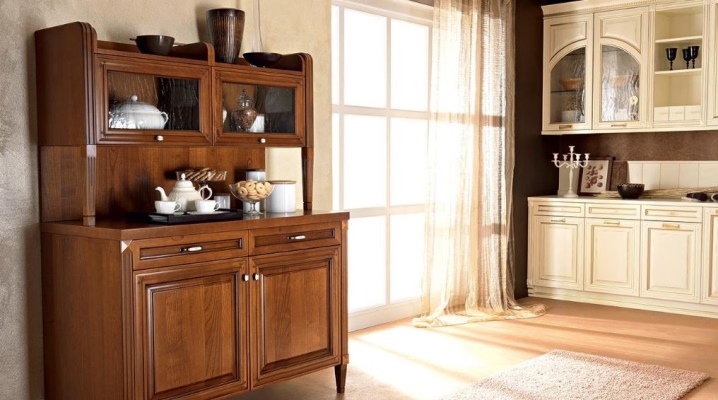
The buffet was invented half a millennium ago, but it is still relevant today. It only seems to us that this is the furniture of our grandmothers, in fact, modern industry creates magnificent designs that can decorate not only the kitchen, but also the living room.
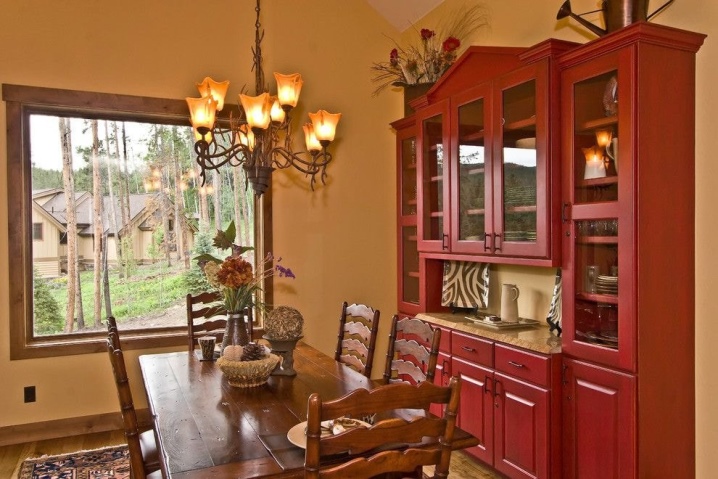
What it is?
Kitchen furniture was used in the Middle Ages. However, the familiar appearance of the buffet began to acquire only in the 17th century. The French borrowed the name for their cabinet in Latin - buffet (bufetum), which means "shiny table". They were pushed to this by the unusual design of furniture: at the bottom - a cabinet, at the top - a wardrobe, and in the center - a surface similar to a table. The French put glass vases with pastries and fruits, bottles of wine on it. When the sun came in through the window, the glass shone and justified the name of the amazing cabinet.
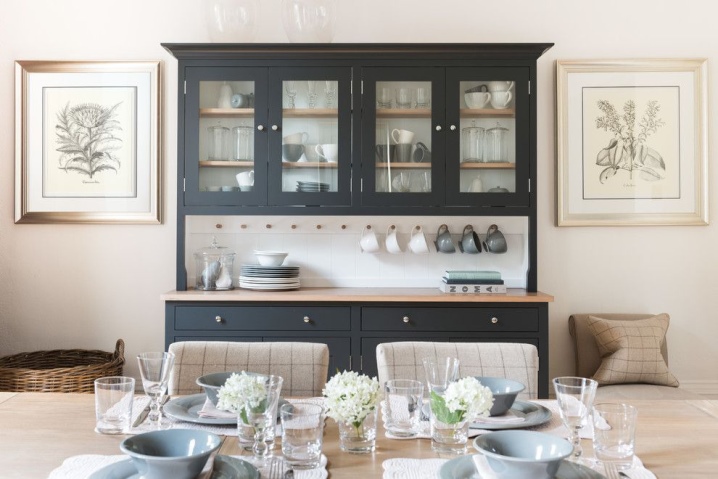
The design of the buffet turned out to be so successful that we still continue to use it. Its success lies in its versatility - the furniture is functional, capable of storing a large number of items and at the same time decorative, designed for beautiful dishes and decorations.
The structure of the traditional buffet has survived to this day.
- The bottom is a massive shortened wardrobe or a large cabinet with doors and shelves. It is used for storing heavy utensils - china sets or metal kitchen utensils.
- The top looks like a cabinet with a glass front, behind which you can see expensive beautiful dishes or decor.
- The central part is always open and free of shelves and drawers. Each housewife has her own idea of how to use it.
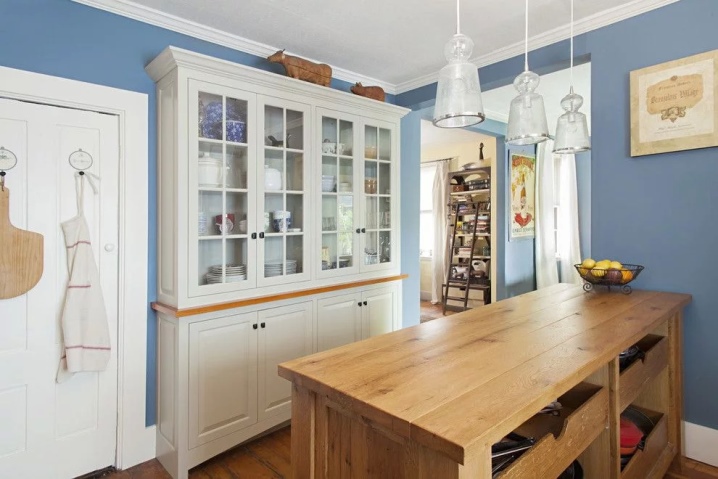
Departing from tradition, the buffet is constantly being modernized, becoming more complex with drawers and figured forms. Today you can find various types of products, in which sometimes you do not immediately recognize a buffet.
This furniture is not limited in size. Height, depth and width are selected taking into account the capabilities of the kitchen. The varied assortment offered by the furniture industry helps to choose a product for any stylized interior. But one should take into account the originality and self-sufficiency of the sideboard, which does not need the company of other furniture. It looks good in isolation, so the place for it is carefully selected before buying.
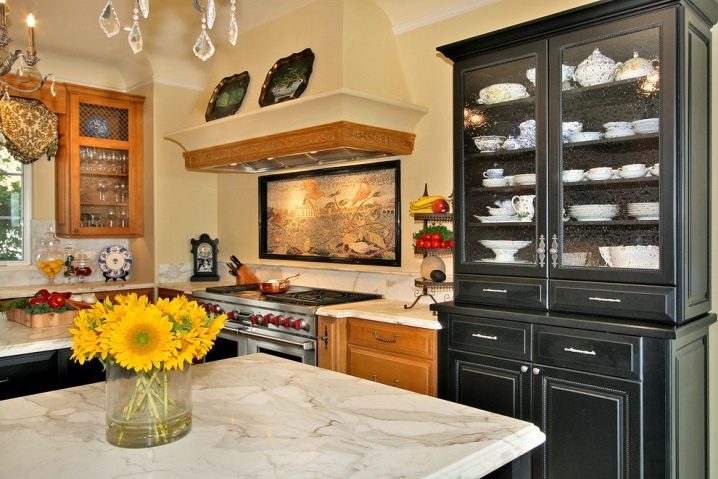
Views
As we have already seen, the traditional sideboard consists of three parts: bottom, top and center. But it is the exception to the rule that makes this type of furniture infinitely diverse. It is generally accepted that the sideboard has a kitchen purpose and is installed mainly in the dining room. If you take a deeper look at the topic, you can find products for the living room, for a small nursery or a garden version on wheels, products are suitable for home and summer cottages. There is a large 4-winged display cabinet, classic 2-winged or mini-products. Or, in general, you can find a structure without a top - the so-called dresser-sideboard. Cupboards are classified into several basic types.
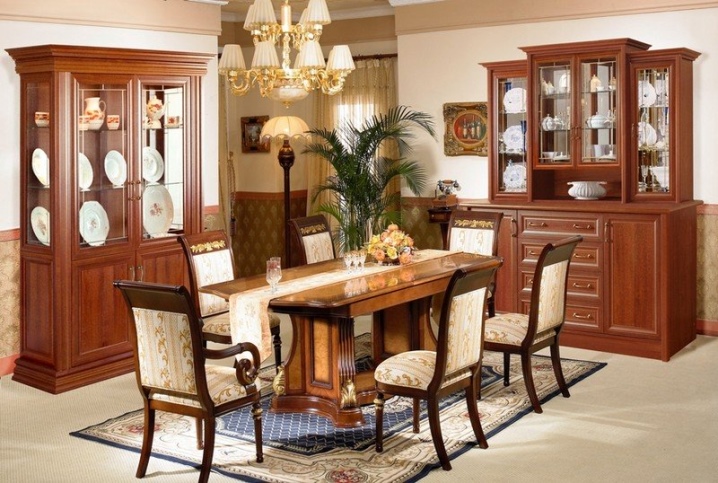
Classical
The classic is the usual 3-tier construction.
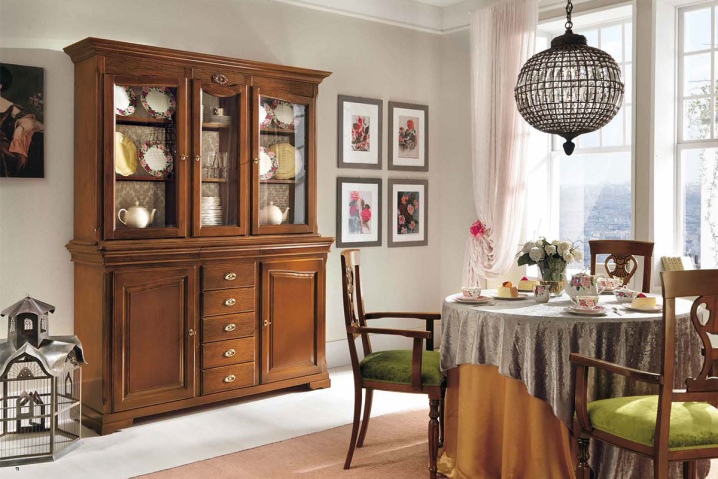
Sideboard
A type of sideboard for the living room, it contains many display shelves, which can be open or under glass. In Soviet times, the back wall was made mirrored, doubling the exposed dishes. The sideboard could contain the lower shelves.
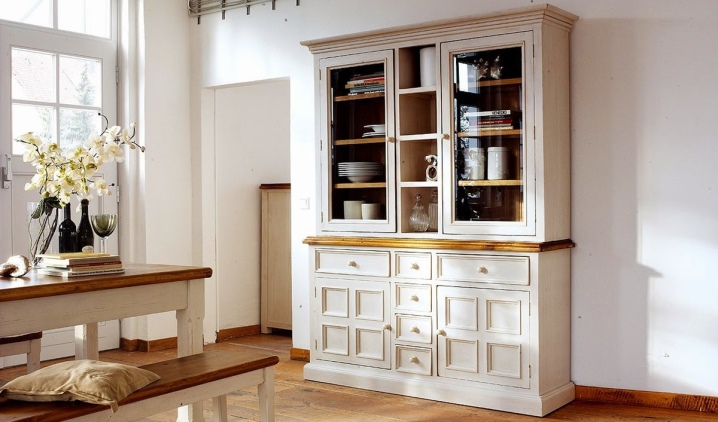
Showcase cabinet
Another type of buffet, but unlike the sideboard, it does not have tightly closed sections - all the contents are displayed.
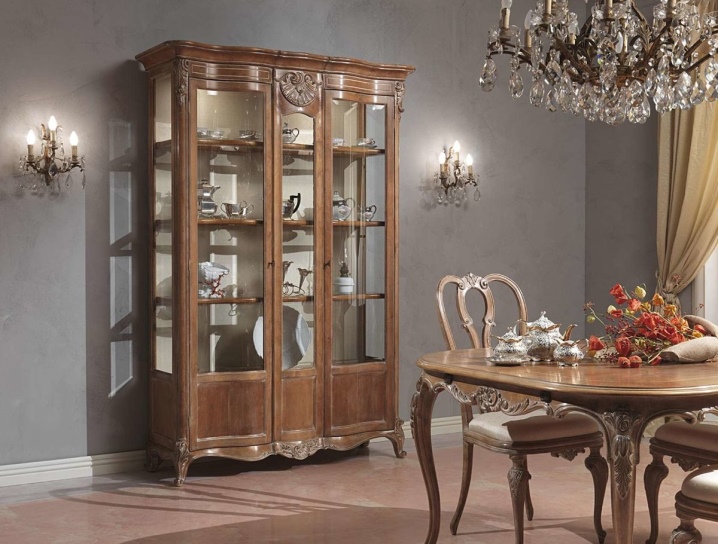
Slide with glass
At first, the slides did not have glass, they just contained open shelves for dishes. They were narrow at the top, widened downward. Modern slides have a tightly closed curbstone with exhibition shelves with a glass facade fixed on it. In the 19th century, glass for structures was made curved, and only rich people could afford such a luxury.
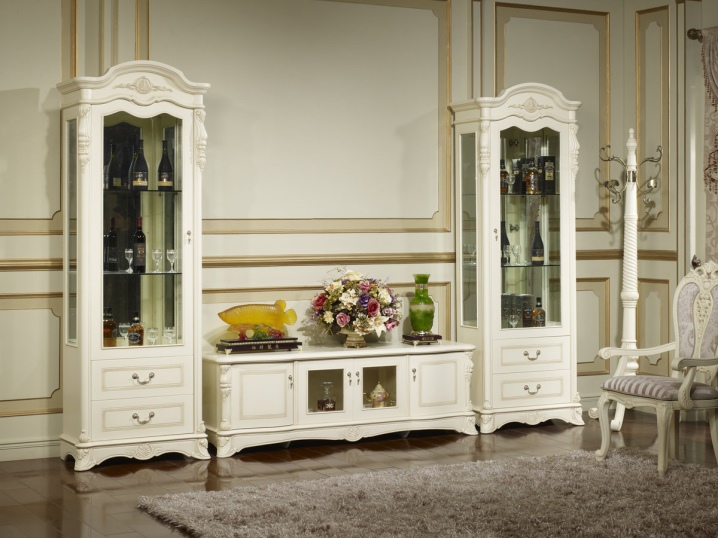
Wardrobe "Helga"
This is an invention of the Germans. The furniture is large and heavy and contains a sideboard surrounded by narrow cabinets.
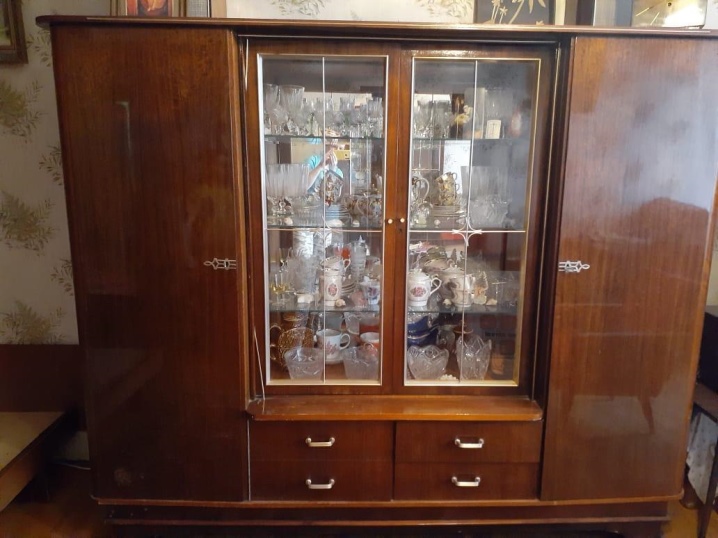
Supplier
A small cupboard is considered the ancestor of the buffet.
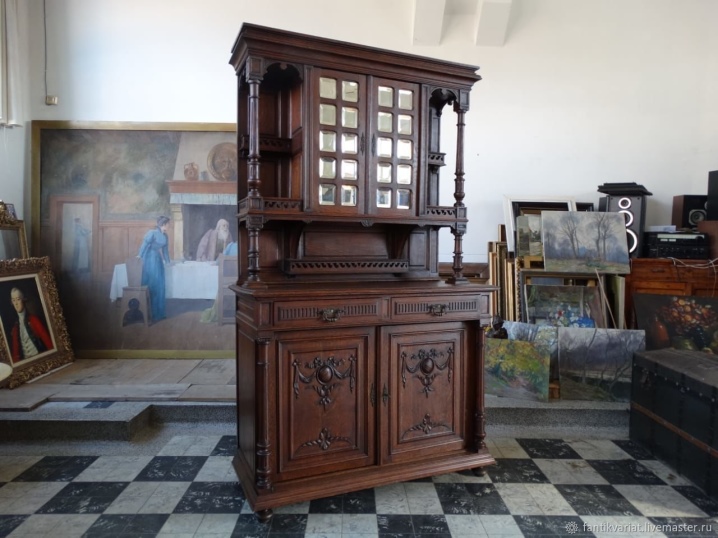
In addition to the general classification, products can be divided by location - against a wall (straight-line) and in a corner (corner).
Structurally, the buffets also have many types. Let's try to understand this abundance with the help of specific examples.
- Some models of crockery furniture do not contain the usual three tiers - two are enough for them: the lower cabinet and the central flat surface, indicated by the rear mirrored wall.
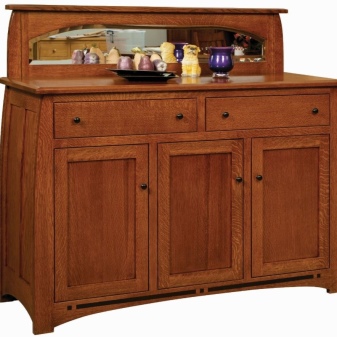
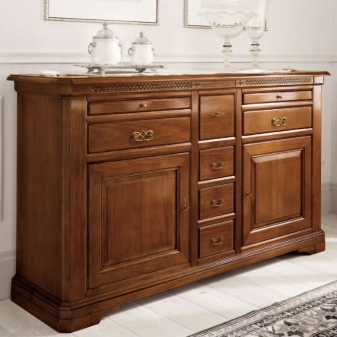
- Even more minimized products are just a cabinet with several sections, but each door is endowed with glass through which dishes flaunt.
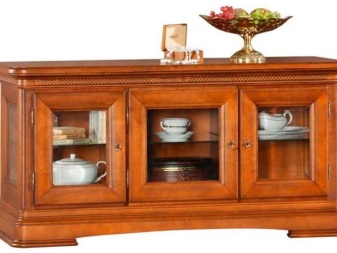
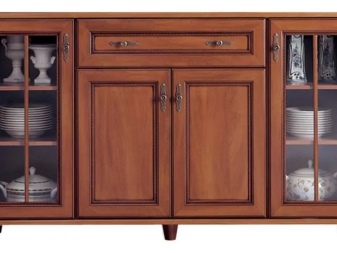
- There are sideboards with blind doors. Their kitchen utensils are indicated by a bottle holder inserted in the center of the structure.
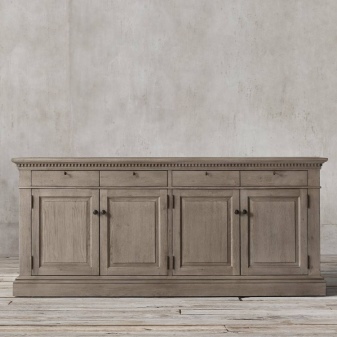
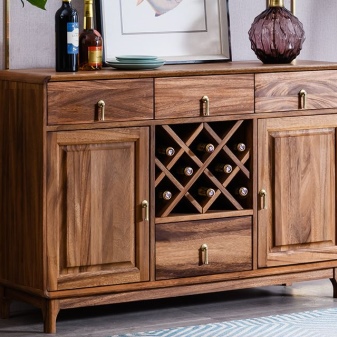
- When you see some of the sideboards, it seems that they have been turned upside down, since the lower part is open for viewing, and the upper one is hidden behind the doors.
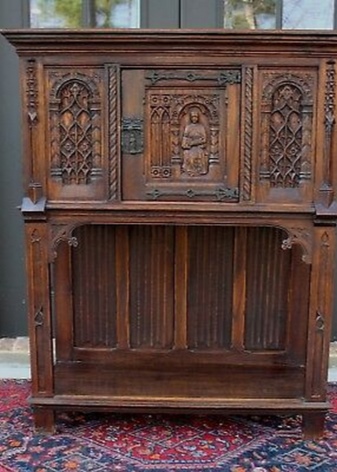
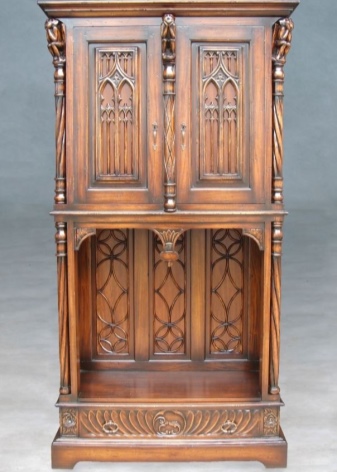
- Sometimes the sideboards are put on display both the upper and lower tiers, decorating them with glass.
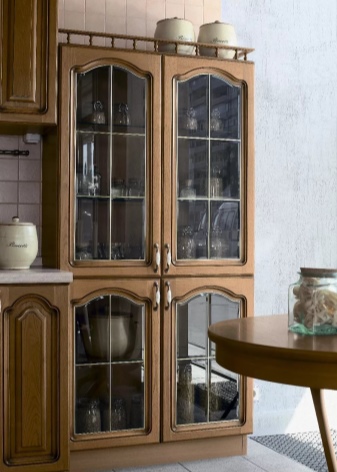
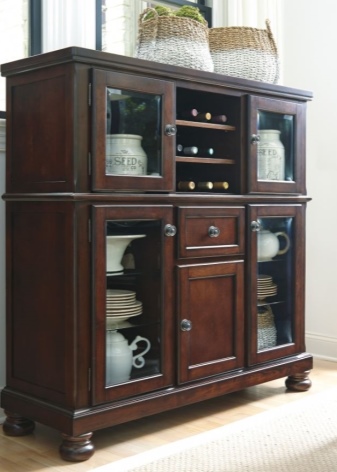
- There are many buffets without a second tier (central). Their facade is made in one plane, and the place where the tabletop could be located is given to horizontal boxes.
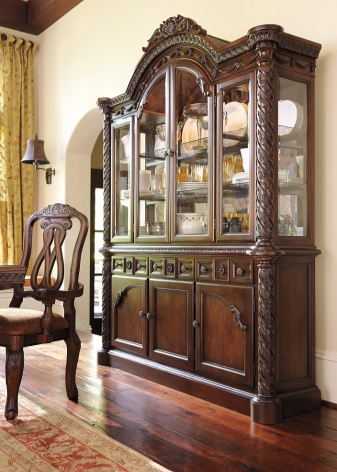
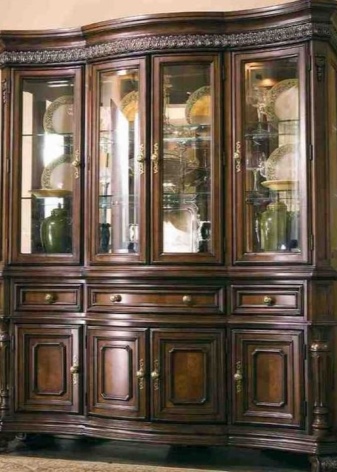
- Bunk sideboards with rounded corners look even better.
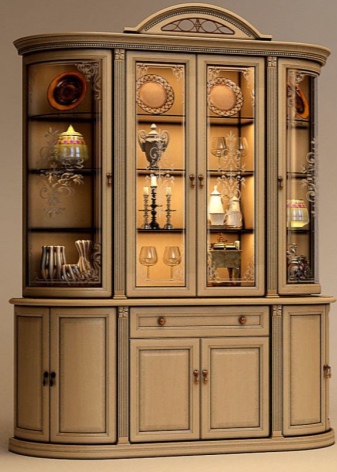
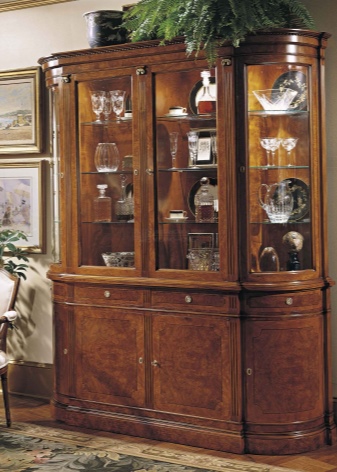
- The design of the antique cabinet is amazingly executed, as if a drawer with glass doors is inserted into its exhibition part, which forms two open shelves around it.
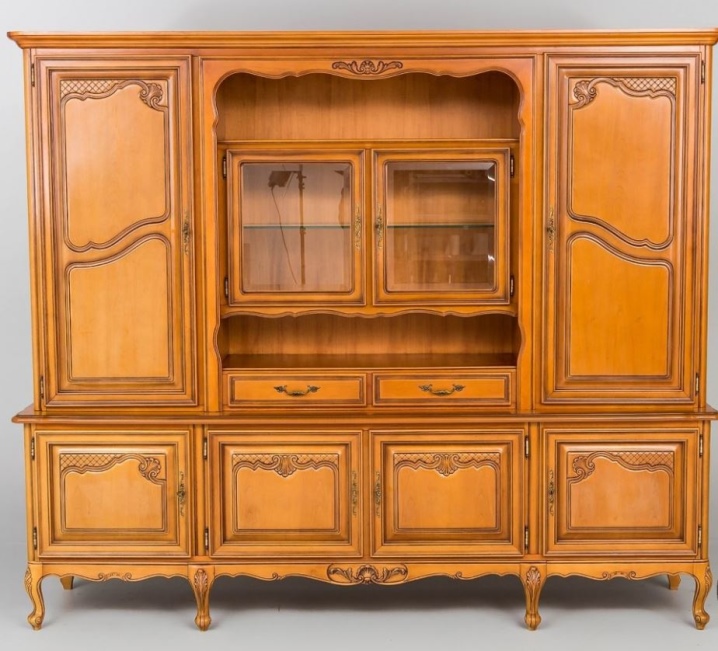
- If the upper tier (showcase) is divided into 3 vertical sections, and the side ones are placed on the countertop, you will get an original design of the sideboard.
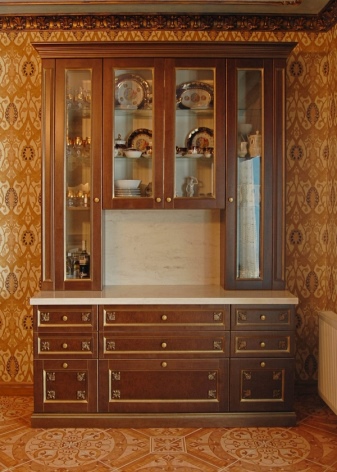
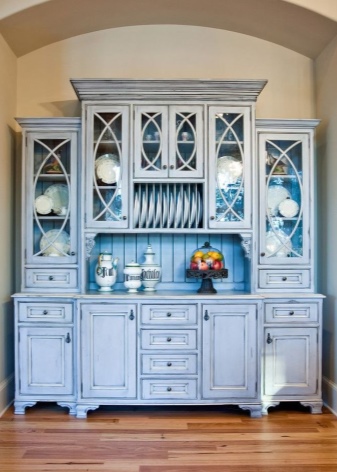
- Sometimes the sideboards come with wardrobes or pencil cases. In this case, an example of an antique version is given.
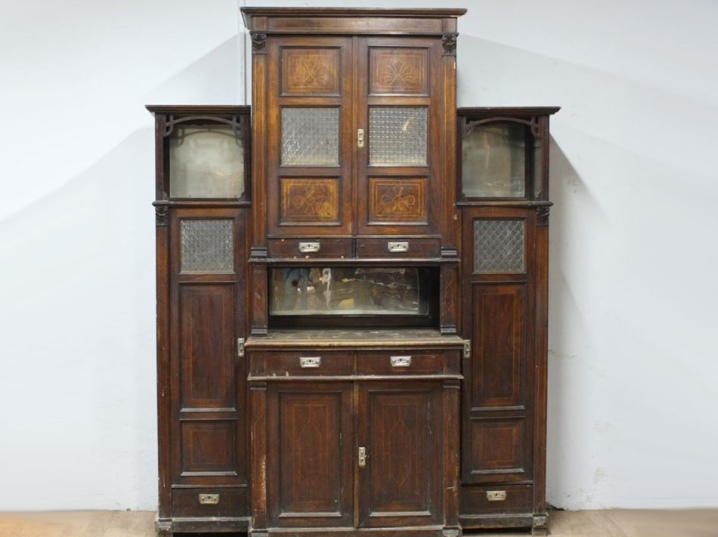
- A small pencil case is built into the structure of the modern model.
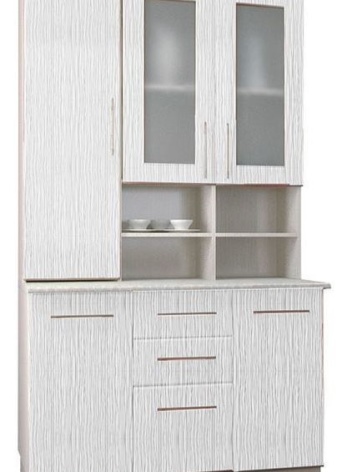
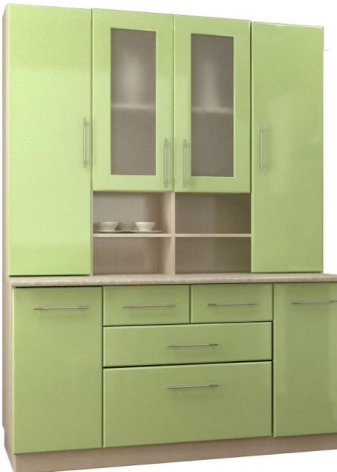
- Often, designers introduce additional elements into classic products, for example, a small retractable tabletop.
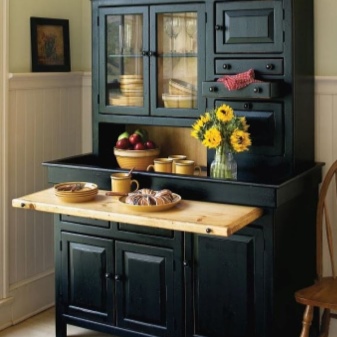
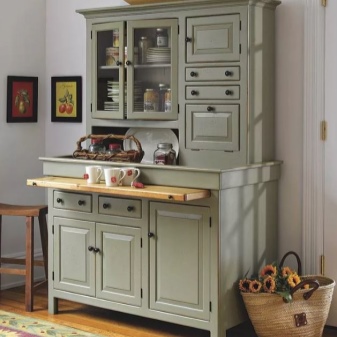
- Additional elements include a section for bottles.
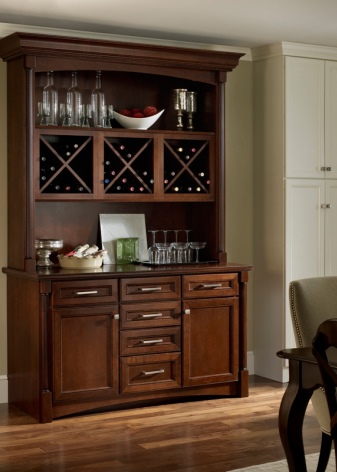
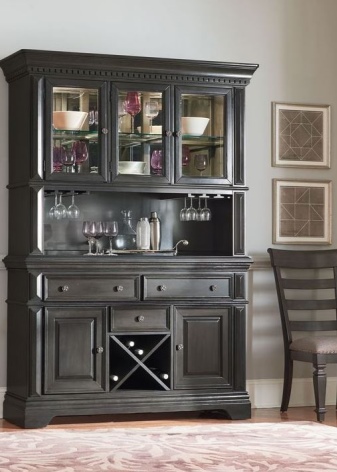
- Stylish sideboards with a narrowed depth have been developed for small rooms.
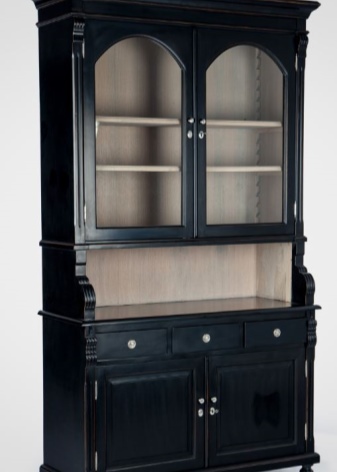
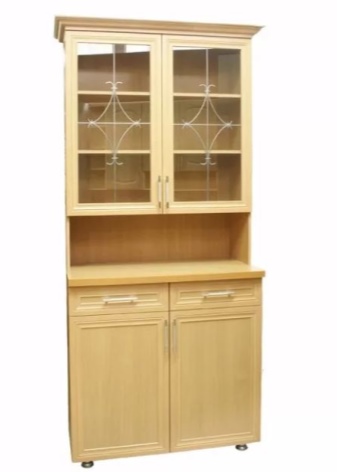
- Compact kitchens can decorate their interior with mini-buffets. Their width is equal to half of a standard product.
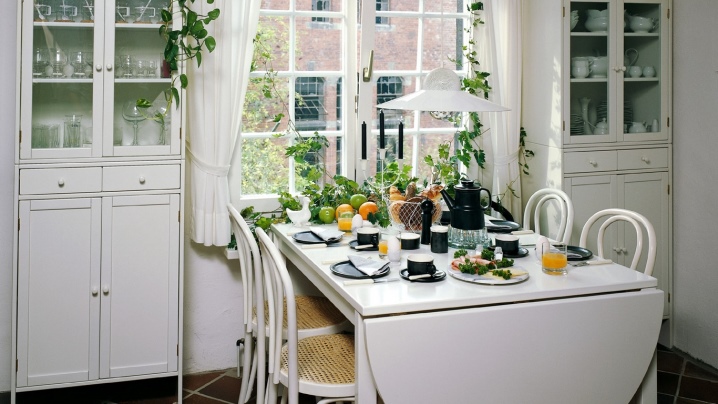
- For large interiors, sweeping buffets with a variety of storage locations and an extensive exhibition area are suitable.
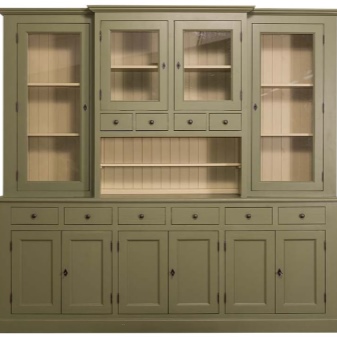
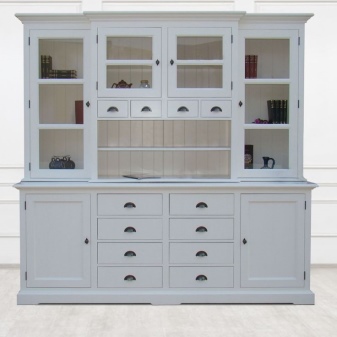
- There are unique projects when manufacturers combine sideboards with other types of furniture and get an effective, cozy and practical product. In this case, the cupboard is combined with a corner sofa.
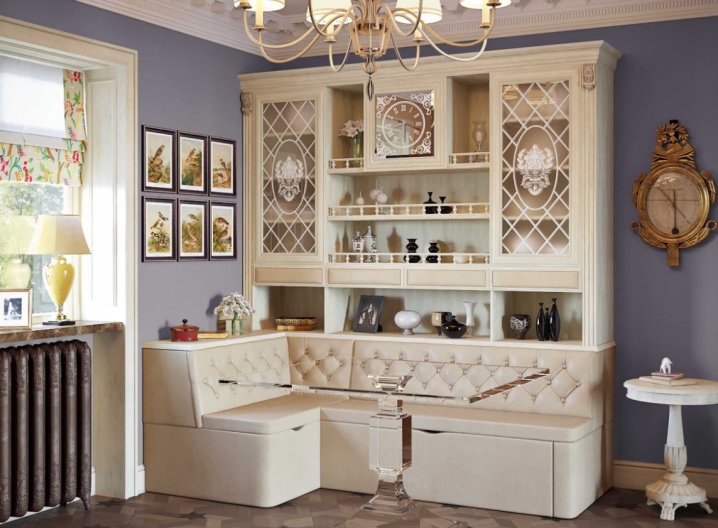
Drawers in cupboards with dishes are a separate topic. Everywhere they are not defined. Pull-out storage areas are not only functional, they shape the design of the sideboard. It is boring to look at closed doors, but if they are separated by vertical or horizontal drawers, the facade will become more diverse.
- Wide sideboard with three horizontal sections. A set of retractable storage locations took up the center of the lower tier, flanked by two blind compartments.
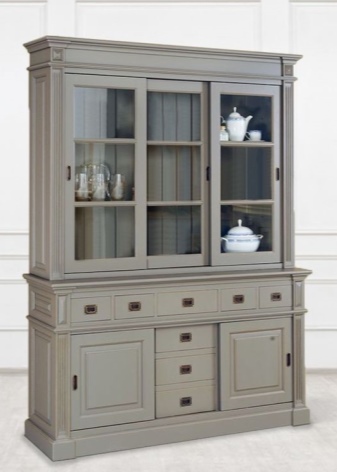
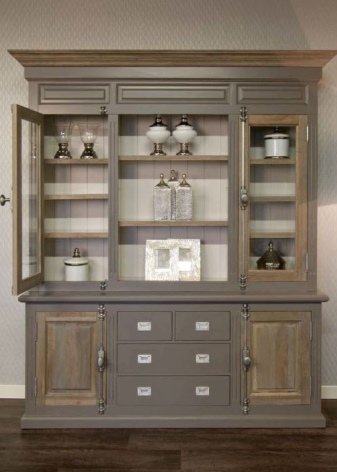
- Drawers located on different sides of the middle tier reduce the usable countertop area, but beautifully form the horizontal lines of the sections of the entire sideboard.
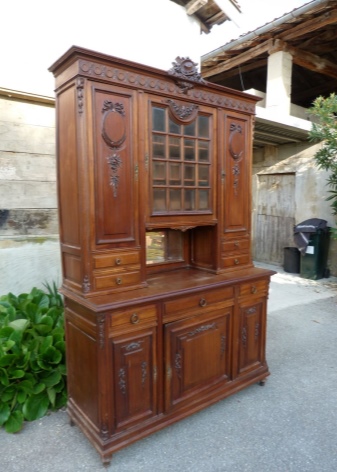
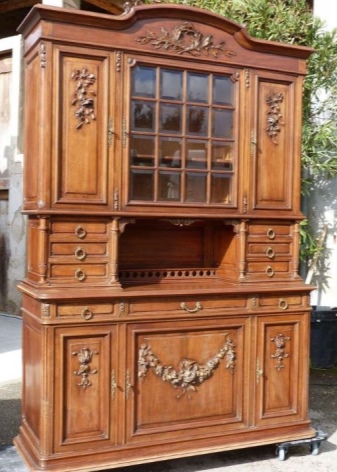
- The drawers divided the middle and upper tiers with an unobtrusive outline, at the same time supporting the same set in the lower pedestal.
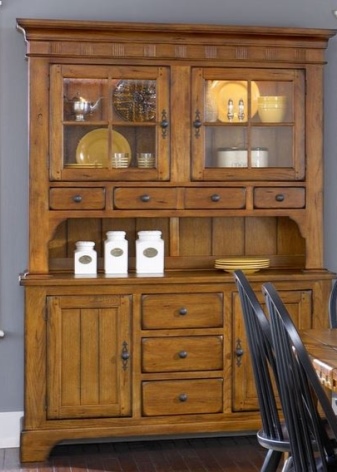
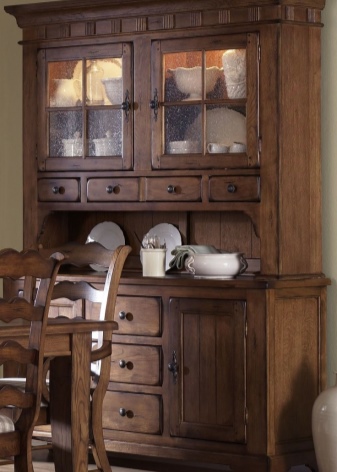
- The design of the 4-section sideboard follows a clear geometry - all 3 of its tiers seem to be divided into small rectangles. The upper and central parts are open to view, while the lower consists of 12 pull-out containers.
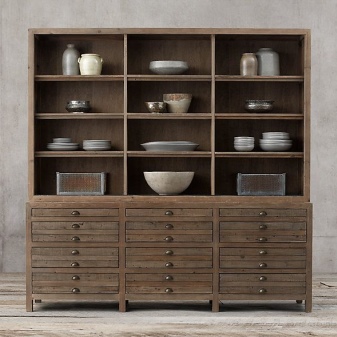
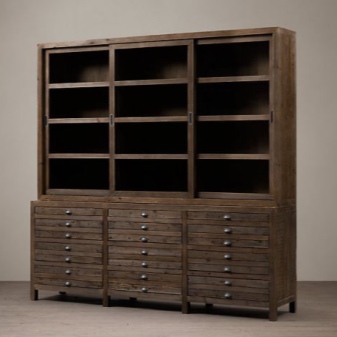
- The bottom cabinet is completely dedicated to pull-out storage areas of various sizes, with the exception of a small open shelf in the center.
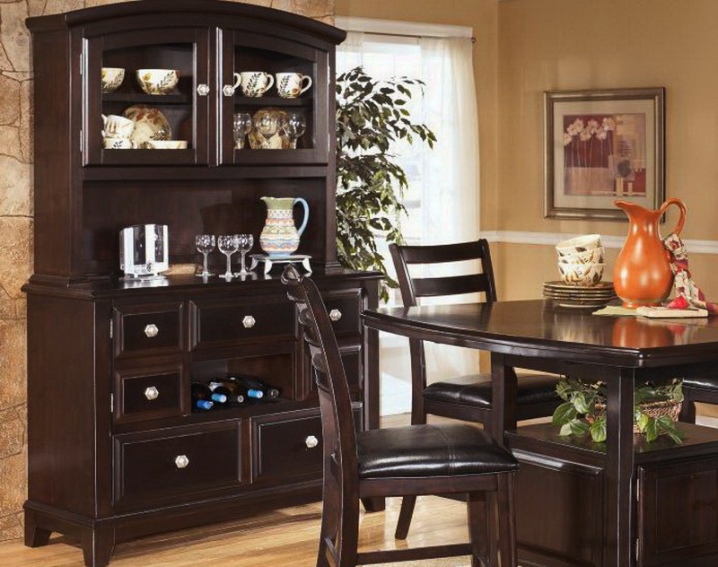
- The bunk sideboard is divided by a strip of horizontal drawers.
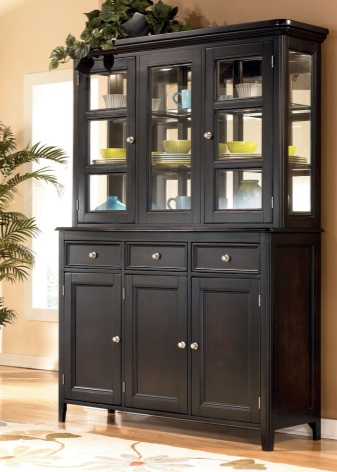
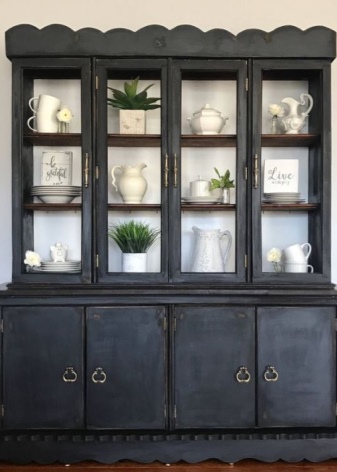
- Two rows of horizontal drawers separate the cabinet from the table top in the central part.
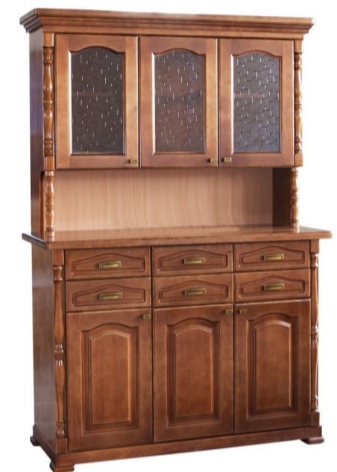
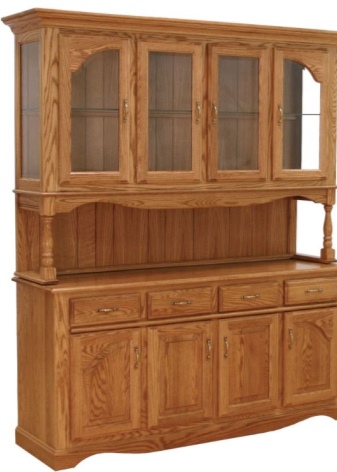
Materials (edit)
Since the sideboards are a type of furniture that has been invented for a long time, they look most organically made of wood. Modern wood-particle boards, imitating different types of wood, are successfully replacing them in our kitchens. Showcases contain materials such as glass, stained glass. And fittings can be made of metal, stone, bone or plastic. Before being used for furniture production, wood is treated with anti-mildew and mildew agents. Sideboards are most often installed in the kitchen, so it is good for such furniture to have a waterproof layer in the form of paint or varnish covering the surface. Products from chipboard and MDF tolerate moisture worse; for these purposes they are often laminated.
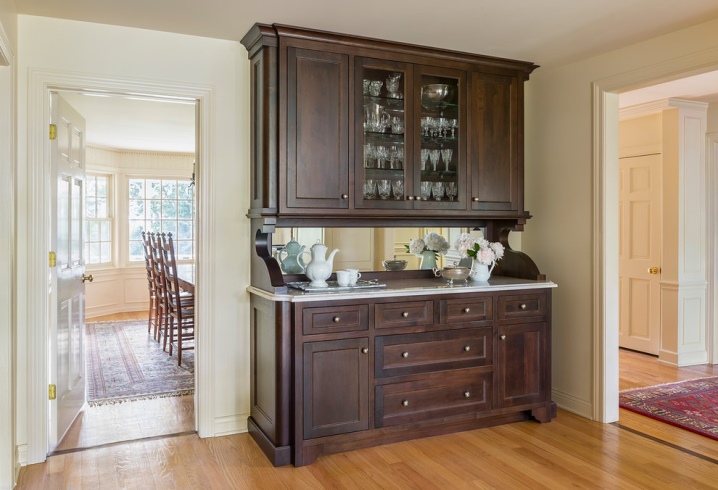
Colors
Since wood or wood imitating materials are used in the production of sideboards, the products have various shades of wood. As for the painted models, they are produced in a large assortment, making it possible to choose colors for any interior. Design solutions can also depend on the place where the buffet will be located. For light rooms, chocolate, cherry, blue, gray and even black colors are quite possible. For dark and cold rooms, choose light and warm shades from white to beige.
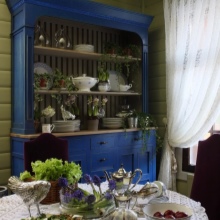
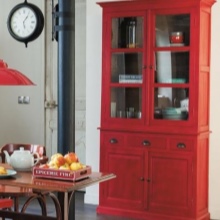
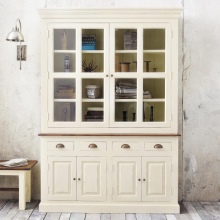
Styles
Modern renovations are increasingly adhering to style solutions, many create the atmosphere around them according to their attitude. Some have a nostalgic attraction to the past, choosing retro, shabby chic, vintage or historical themes. Those who prefer comfort will turn their attention to rural areas (country, provence, rustic, chalet). Modern interiors are characterized by laconicism, they have the opportunity to use all kinds of the latest materials.
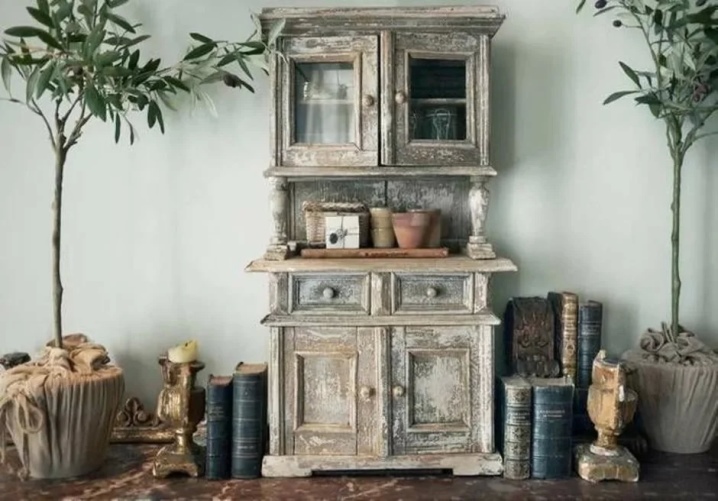
When you have chosen a place for the buffet, you need to look around to understand what setting dominates the room, because the purchased model must match it.
Retro
Translated from Latin, this word means "back", that is, any things from the past or artificially aged furniture are considered retro, regardless of time boundaries. It should not be confused with the concept of vintage, which means only authentic furniture that has become a symbol of an entire era. Retrostyle can include vintage or antique sideboards as part of a general trend.
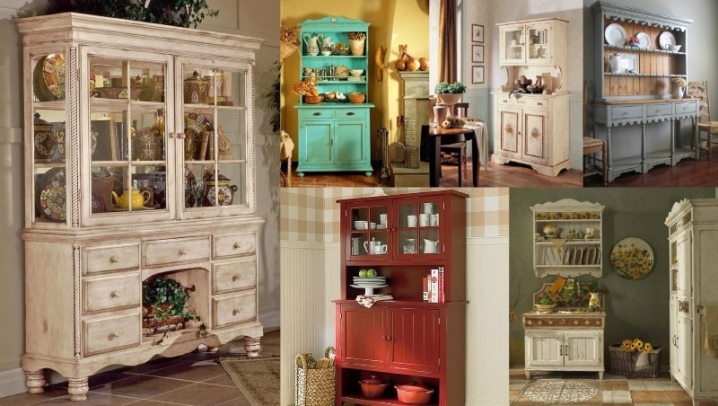
This is the style of true connoisseurs of beauty, each buffet can create the atmosphere of a particular era that it represents. If you put a cupboard with utensils from the past in a room with a modern renovation, it will still affect the perception of time. As proof, consider examples of retro furniture on display in modern kitchens.
- The sideboard with doors decorated with decoupage technique is simple and straightforward. Surely it was removed from the attic of some grandmother and was able to organically fit into the comfortable interior of the village direction.
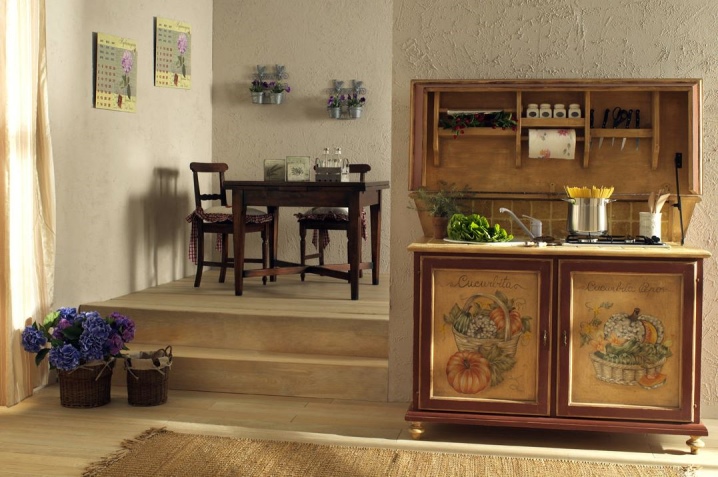
- The crockery retractable cabinet is made of solid wood, it does not contain glass display cases, only open shelves. The model is attractive for its simplicity and functionality. In an interior with bleached log walls, it can be used in retro, provence, shabby chic styles.
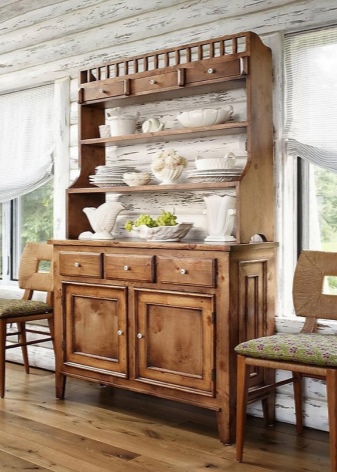
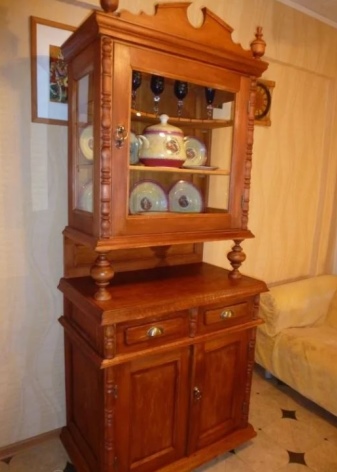
- Another example of timeless furniture that creates warmth and comfort in any kitchen. In this interior, retro is seen in the design of the entire furnishings: a dining group, a lampshade over the table, a homespun rug were taken from the past.
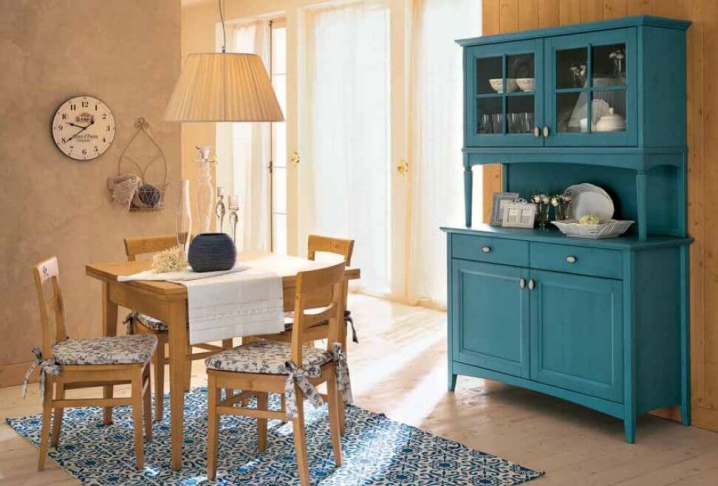
- The chic buffet-bar in a rich rare color is a European retro trend. The model contains enough storage space for functional and decorative applications.
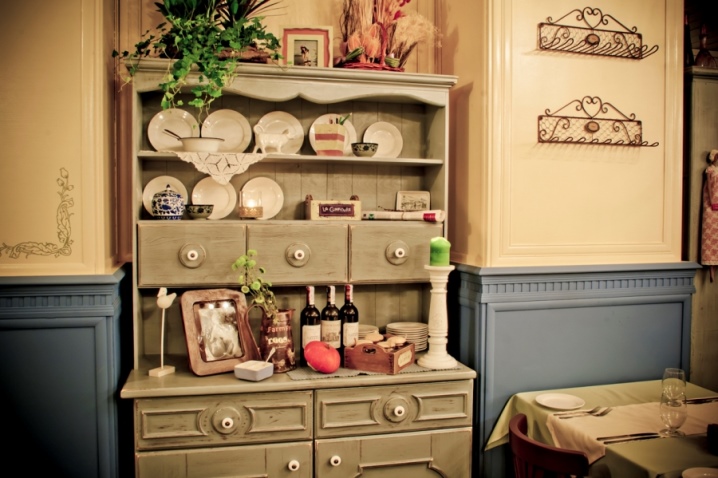
Scandinavian
The Scandinavian style loves light, space and a lot of air; such interiors do not contain too heavy furniture. The abundance of open shelves or glass fronts allows structures to be lightened and filled with light. Often, storage systems are complemented by wicker baskets, boxes displayed on open cabinet shelves. The Scandinavian trend is characterized by white colors, but other shades can also be found. The style uses only natural wood, natural or painted look. Sideboards can have legs or a basement, they are laconic, functional, and do not contain pretentious decor. All this can be seen in examples.
- The beautifully whitewashed buffet creates an atmosphere of the past, in which there is a sense of coziness and serenity.
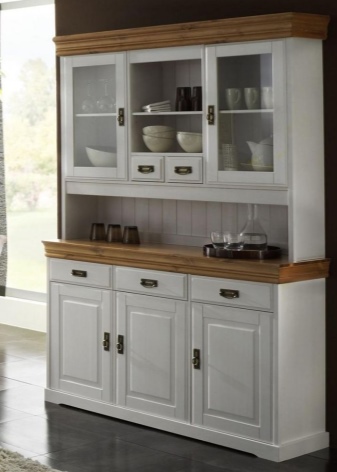
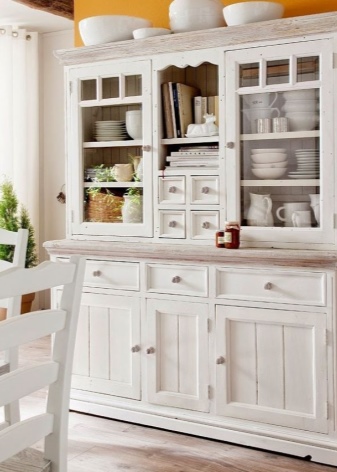
- Simple white graceful sideboards are light and airy. They are filled with dishes of the same white color and, despite the rough shapes of the plates and cups, the contents of the cabinet are in perfect harmony with its appearance.
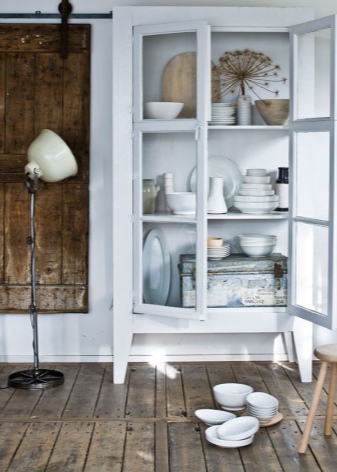
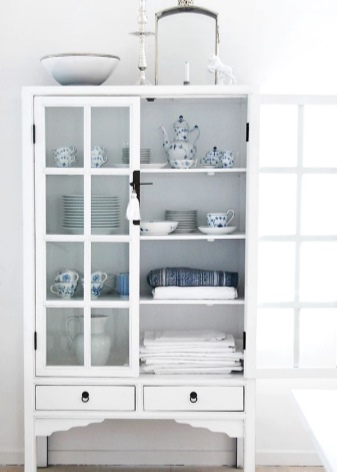
- The retro buffet with open shelves has been specially selected in a dark color to provide a contrasting backdrop to the dazzling white tableware typical of the Scandinavian style. This direction has only functional decor (except for plants); in this model, the dishes themselves are furniture decoration.
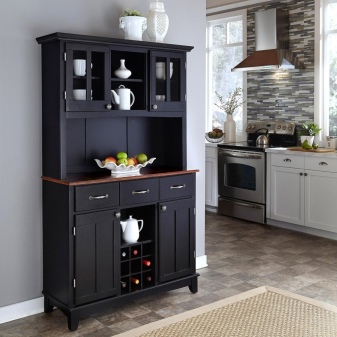
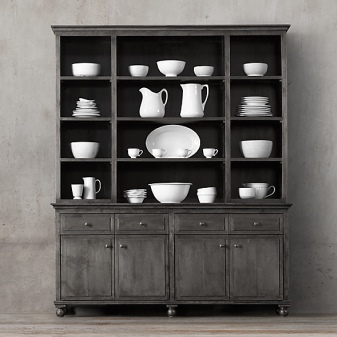
- The sideboard is designed for a large kitchen, complemented by bottle holders and practical baskets. The decor includes dishes, fruits and herbs.
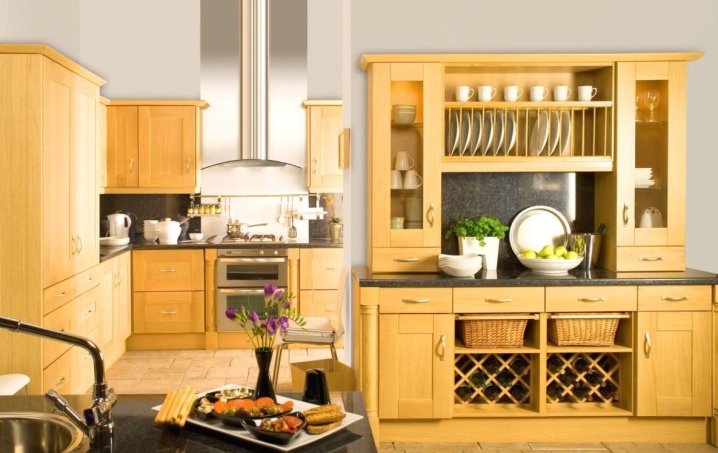
American
Americans love and create large and most comfortable furniture, this also applies to sideboards. They prefer solid wood. Cupboards are mainly made from dark woods and have a simple and practical appearance. In the American interior, you can find both modern and retro buffets, which may turn out to be artificially aged furniture or real antiques.
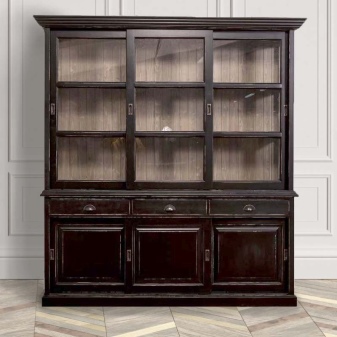
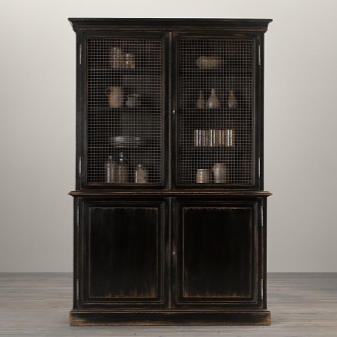
Country
Cozy colorful rustic style. It should be noted that this vast area has many different national branches, and the furniture may vary somewhat. But they also have common features - cupboards made of wood are simple, no frills, very practical, endowed with many shelves and drawers... Sideboards of such types of country as American, chalet, rustic, are made of dark wood, look large and rough. In the English country style, the sideboards are more prim, austere, geometrically justified.
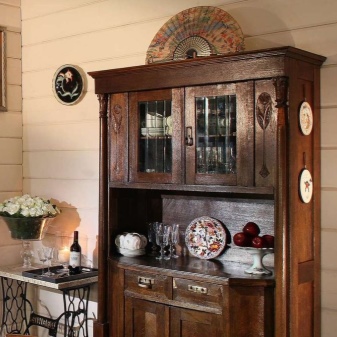
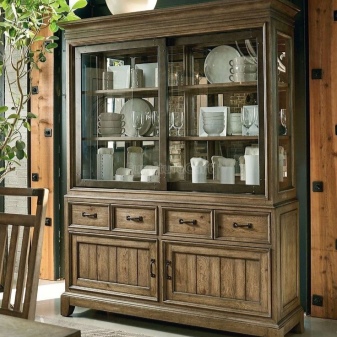
The style of the French Provence village stands out from this company. Sideboards made of natural wood have a whitewashed, aged look, shelves are decorated with crockery and numerous rustic décor, creating the image of a light, homely and very cozy kitchen.
Loft
The direction appeared during the Great Depression in America, when empty production workshops began to be given away for housing. Plaster, brickwork, wood and metal became the main characteristics of the style. Loft loves large free space, so sideboards and other furniture should not be massive, on the contrary, they are compact and simple in design. Metal and wood are often involved in the creation of the sideboard, sometimes glass is connected, but in most cases the shelves are open. There are all metal sideboards.
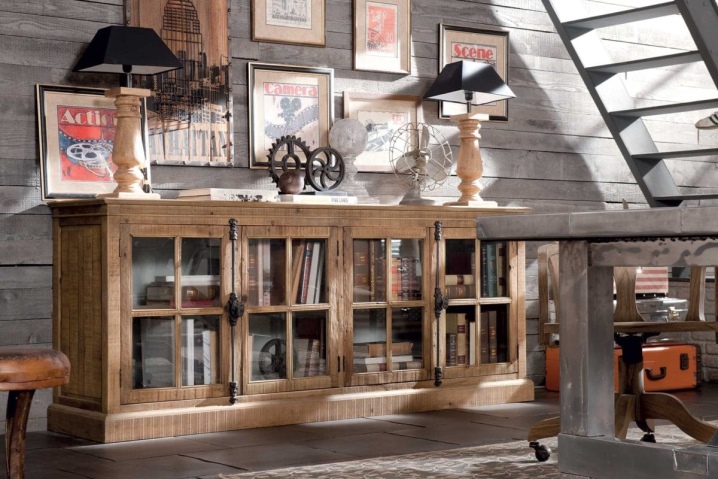
Classic
The style is characterized by restrained aristocracy. The buffets look expensive, but uncommon. They are produced from natural wood or a material imitating it (MDF, chipboard). The design is made in compliance with symmetry, all details are made in strict geometric proportions.
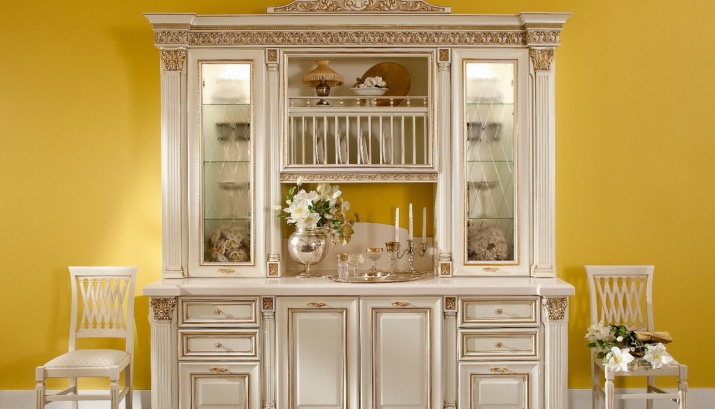
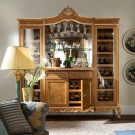

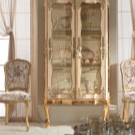
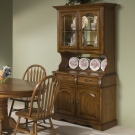
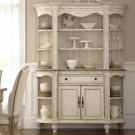
Manufacturers
All factories that produce furniture (Belarusian, Italian, Spanish and others) develop their own types of cupboards. Moreover, domestic manufacturers do not lag behind their foreign counterparts in design and quality. Several companies can be especially noted.
- Zavolzhskaya factory "Utah" produces sideboards only from natural wood - birch, oak, ash. High quality varnishes and paints are used.
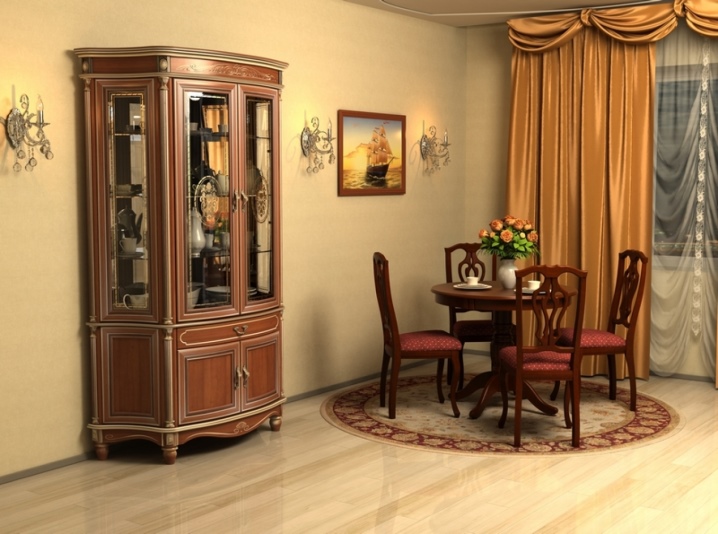
- Iskitim company "Yunna" in its collections of kitchen furniture it has several types of sideboards of good quality and loyal value.
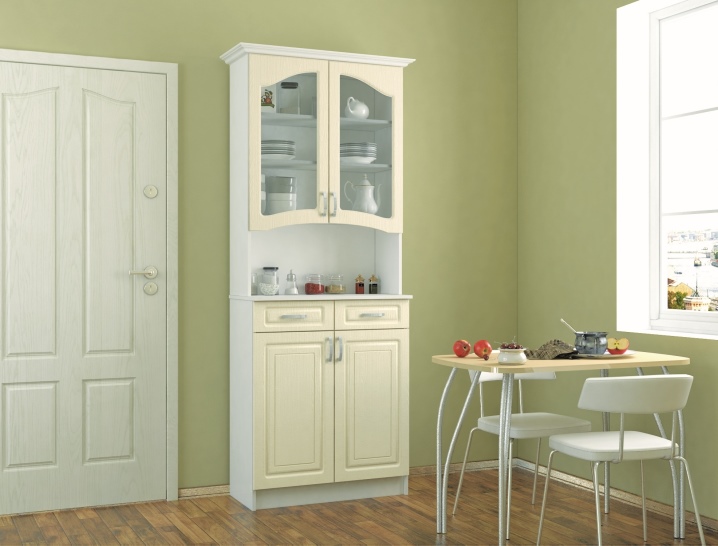
- Rostov factory "Progress" produces sideboards made of oak and ash with a beautiful and complex design.
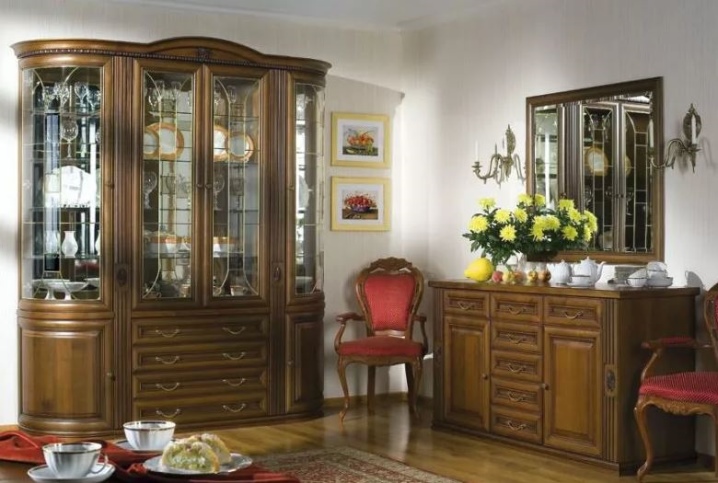
- Excellent, visually light buffets from MDF "Constance" produced by the MIF factory in Penza.
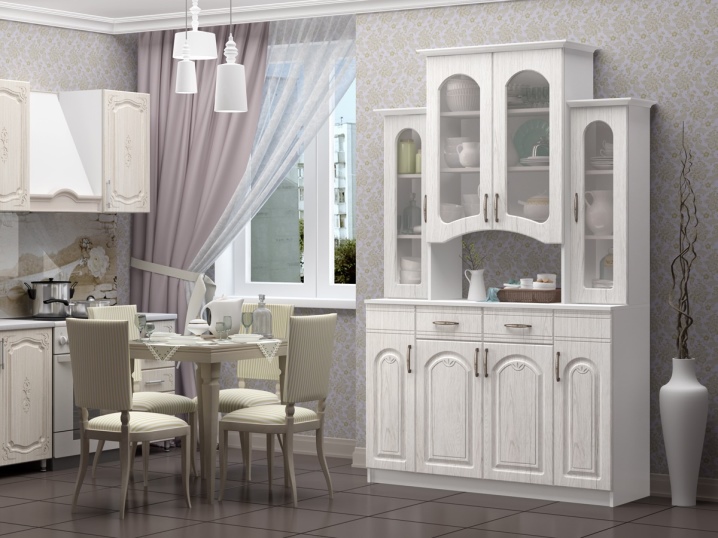
- Stylish modern cupboards are designed by the famous Camelgroup factories made in Italy.
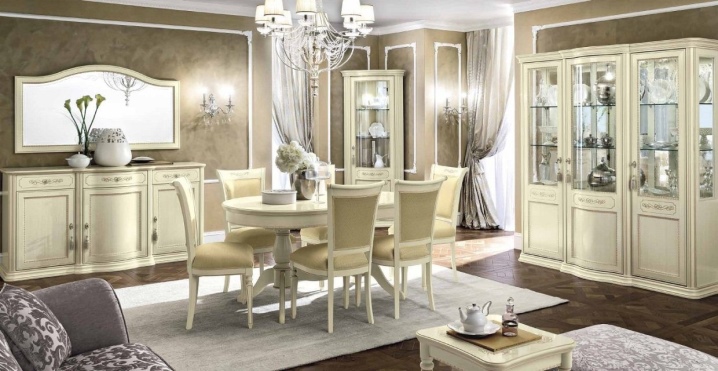
- Elite expensive buffets produces German company Barnickel.
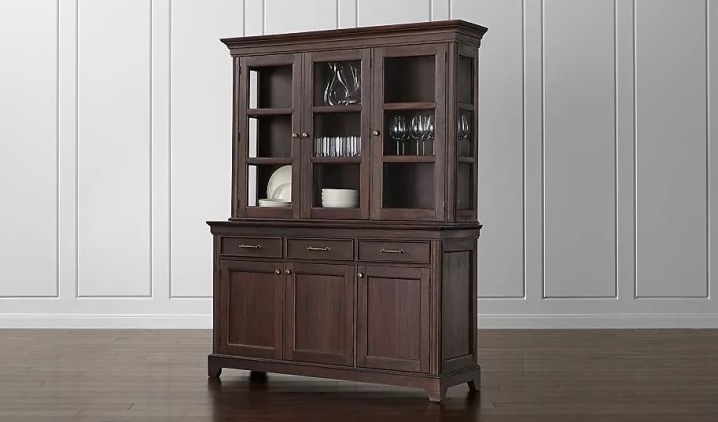
Beautiful examples in the interior
Sideboards belong to special wardrobes, their multi-tiered design allows designers to fully express their imagination and come up with something incredible and perfect. Here are examples of beautiful models in the design of different interiors.
- A very beautiful antique piece with artistic carvings in a very rare design. The structure traditionally contains 3 tiers, but they all violate the usual structure of the buffet. First of all, these are non-standard sizes - the upper and lower parts are narrow, and the middle part is wide (by tradition, everything is arranged the other way around). In addition, there is no clear constructive sequence - a curbstone, a table, a showcase. All compartments in the product make up a set of open and closed shelves and drawers.
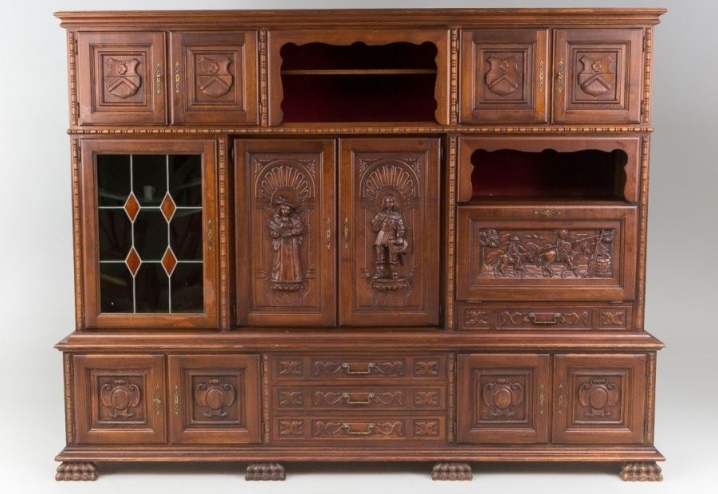
- An incredibly beautiful antique model, executed in a classic style. The sideboard is decorated with stained glass, balusters and wood carvings.
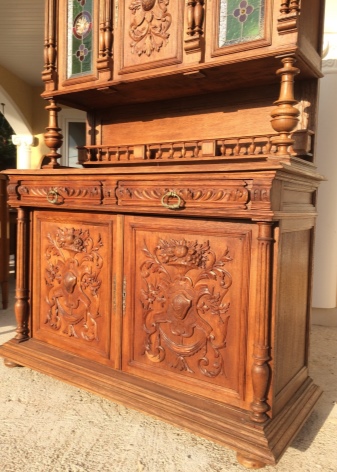
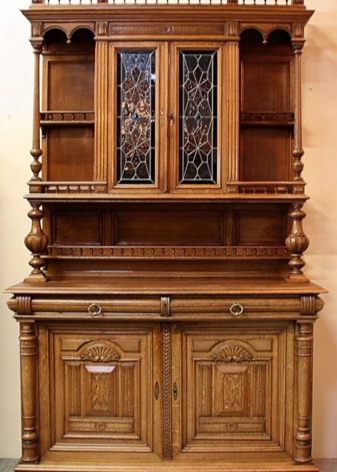
- Another antique masterpiece with amazing wood carvings. The dimensions and purpose of all three tiers are rather conditional.
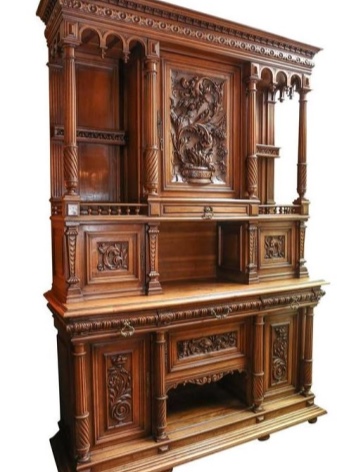
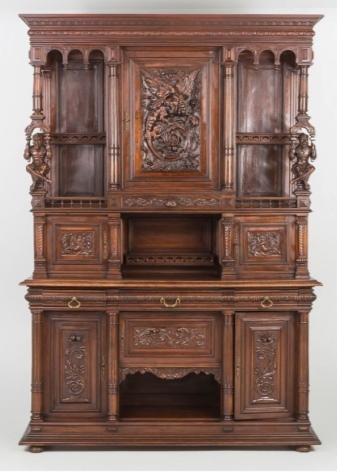
- A modern sideboard made to look like antiques.
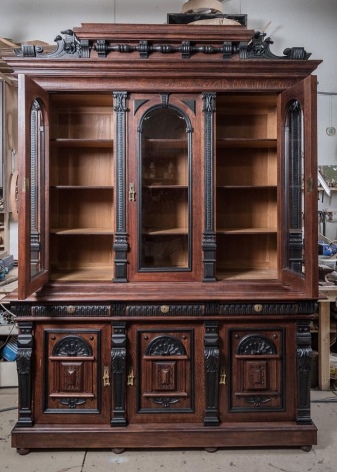
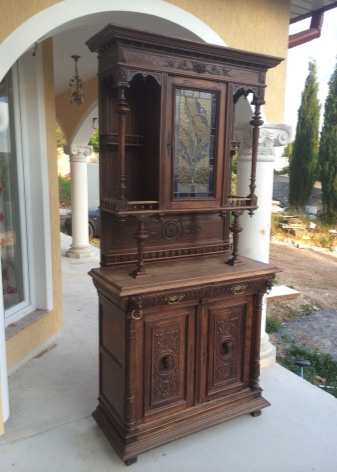
- A classic product with lots of shelves and drawers. The model is composed of several types of wood, working in contrast.
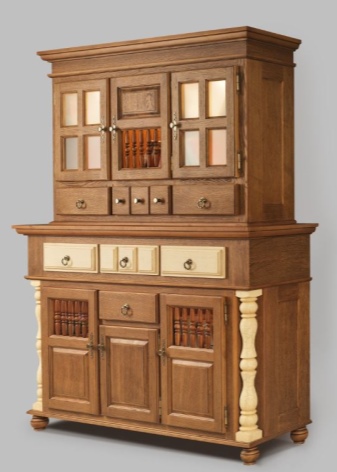
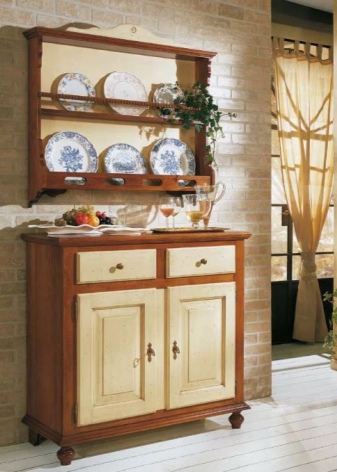
- A rare buffet structure. It feels aristocratic and graceful, despite the almost complete absence of open shelves.
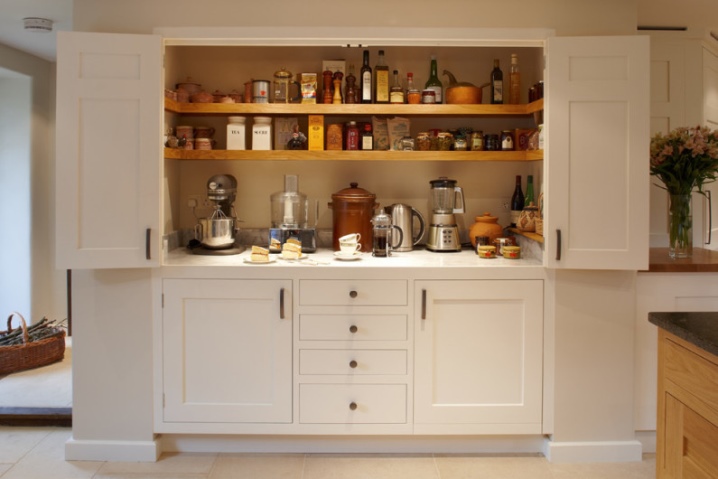
- Continuing with the antique theme, consider a fantastically beautiful sideboard created by a genius of the past. The doors are decorated with carved dragons, the decorated back wall smoothly rolls over to the ceiling above the upper shelf.
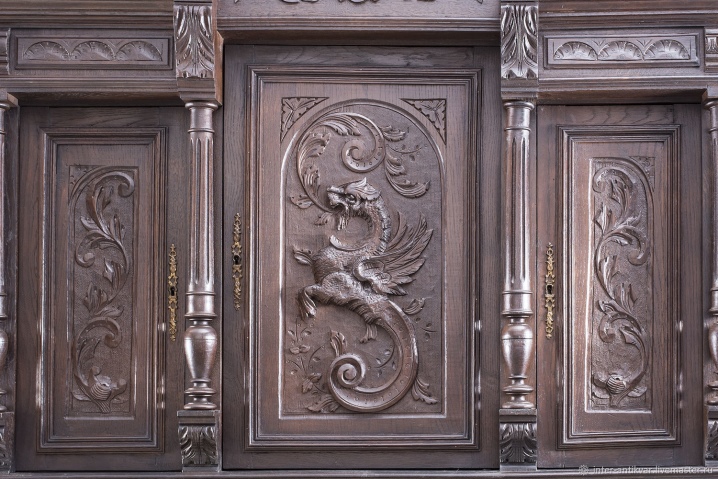
- An ancient two-tiered sideboard, the same age as the events depicted by the master on the doors of the facades, tinted in bronze.
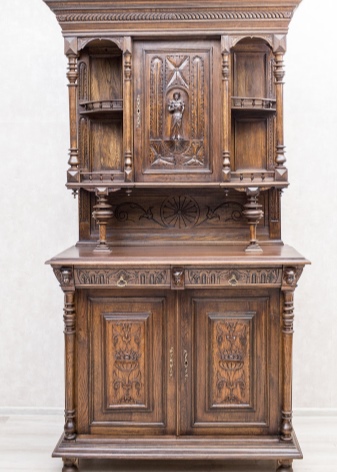
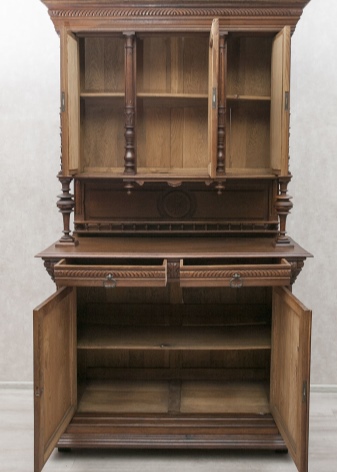
- Modern sideboard in classicism style. A chest of drawers is taken as the basis for the lower tier.
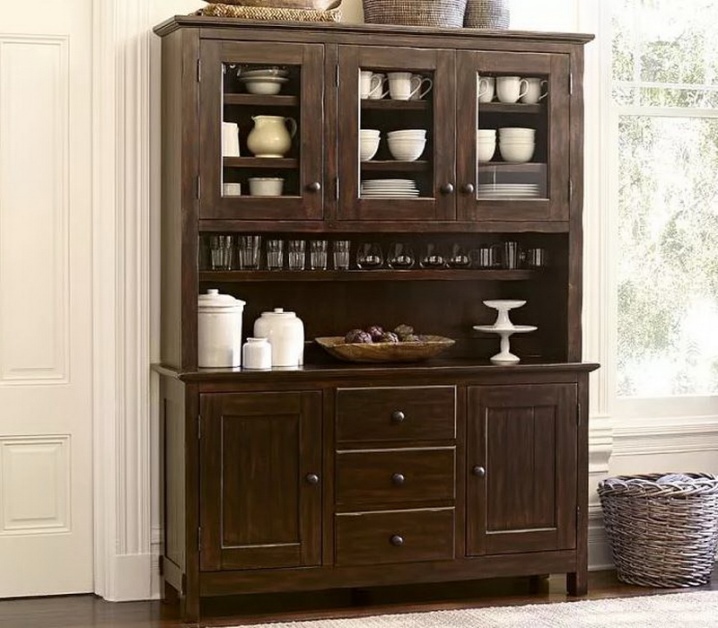
- A beautiful retro buffet decorated with a hunter-fisher theme.
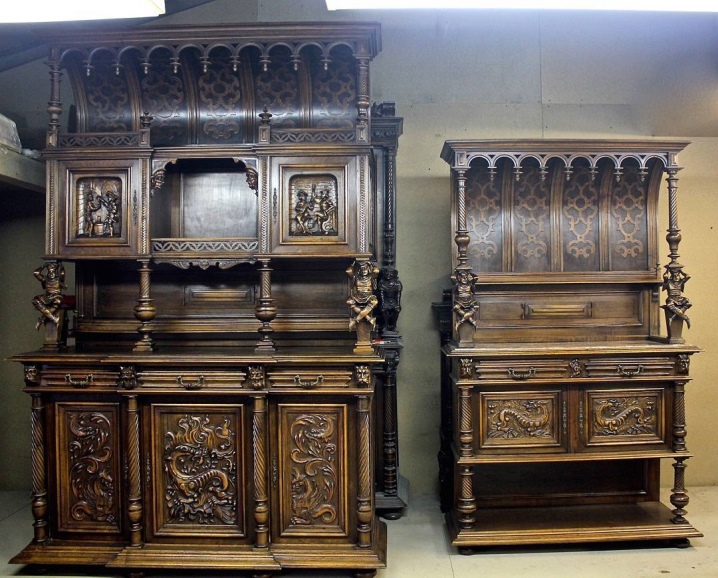
- Italian cupboard for dishes, the upper exhibition section is divided into two parts: open and under glass.
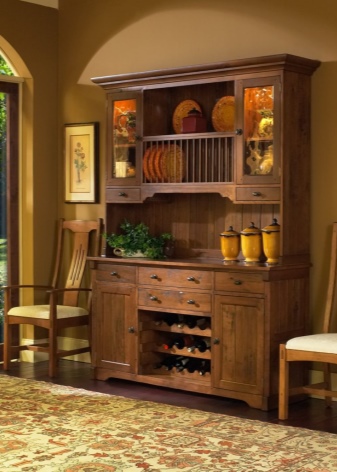
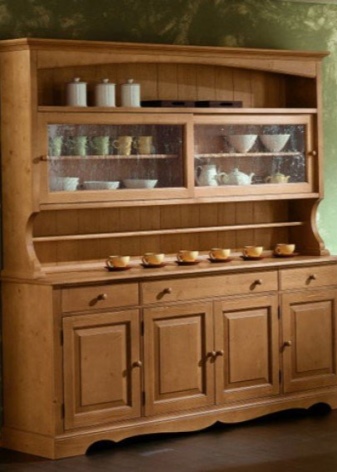
- The crown that forms the top of the sideboard emphasizes its regal grandeur.
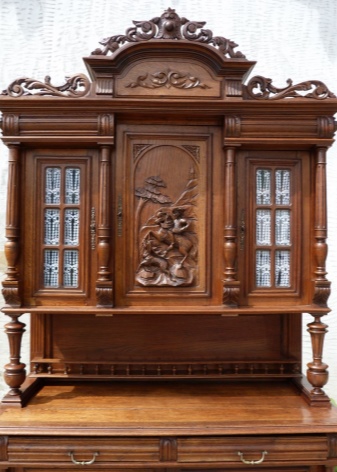
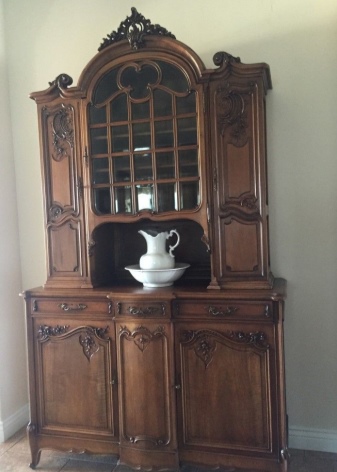
The sideboard is unique in its versatility, it has many different storage places, shelves for decoration and is structurally arranged so that it itself becomes an interior decoration.
For information on how to choose the right buffet, see the next video.












The comment was sent successfully.